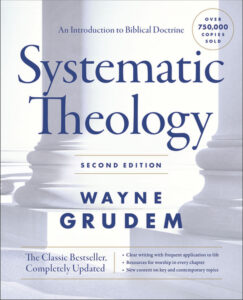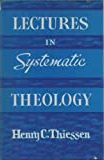 Zondervan recently published the second edition of Wayne Grudem’s Systematic Theology: An Introduction to Bible Doctrine. The first edition was published in 1994, and sold (according to the publisher) over 750,000 copies. This is a massive book of over 1,600 pages. Grudem, formerly of Trinity Evangelical Divinity School, is distinguished research professor of theology and biblical studies at Phoenix Seminary in Phoenix, Arizona, and author of many books. He holds degrees from Harvard, Westminster Seminary, and Cambridge.
Zondervan recently published the second edition of Wayne Grudem’s Systematic Theology: An Introduction to Bible Doctrine. The first edition was published in 1994, and sold (according to the publisher) over 750,000 copies. This is a massive book of over 1,600 pages. Grudem, formerly of Trinity Evangelical Divinity School, is distinguished research professor of theology and biblical studies at Phoenix Seminary in Phoenix, Arizona, and author of many books. He holds degrees from Harvard, Westminster Seminary, and Cambridge.
I want to focus on the differences between the first and second editions, which mainly consist of additional material. I am glad to see that the preface to the second edition has a list of the additional material, which increases the size of the book by “about 16 percent.” The additional material—some good and some bad—includes completely updated bibliographies, all Scripture quotations changed from RSV to ESV, additional discussion of specific “problem verses” for biblical inerrancy, a more extensive critique of open theism, a new discussion and critique of middle knowledge, an extensive discussion of Free Grace theology, a “completely revised, stronger chapter” on creation and evolution, a critique of the New Perspective on Paul and its view of justification, a contemporary worship song added at the end of each chapter, a critique of preterism, and the indexing of topics covered in twenty-one new systematic theology texts published since 1993.
Grudem is a Calvinist, hence his critique of middle knowledge and Free Grace theology. Grudem is very good on theistic evolution, but don’t let his “completely revised, stronger chapter” on creation and evolution fool you. Grudem says that he now believes in an earth and a universe that are billions of years old. Same for his critique of preterism. It is good, but Grudem is a historic premillennialist and rejects dispensationalism. The best change in the second edition is Grudem’s new defense of the translation of “only begotten” rather than “only” in John 3:16 and elsewhere (pgs. 293-296).
 Since Grudem is a Baptist, Baptists in particular will want to read his chapters on church government and baptism. Back when I taught theology, I owned at least twenty books titled Systematic Theology. Which one is the best? Hard to say. Even though it is dated, I still recommend Lectures in Systematic Theology by Henry C. Thiessen (Eerdmans, 1949). It is Baptist, orthodox, dispensational, and premillennial. This was revised by Vernon D. Doerksen (Eerdmans, 1979), some of it rather extensively.
Since Grudem is a Baptist, Baptists in particular will want to read his chapters on church government and baptism. Back when I taught theology, I owned at least twenty books titled Systematic Theology. Which one is the best? Hard to say. Even though it is dated, I still recommend Lectures in Systematic Theology by Henry C. Thiessen (Eerdmans, 1949). It is Baptist, orthodox, dispensational, and premillennial. This was revised by Vernon D. Doerksen (Eerdmans, 1979), some of it rather extensively.